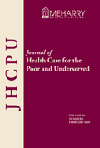A trio of speakers from the Office of the National Coordinator (ONC) for Health Information Technology will serve as keynote speakers at the ACU Health IT and the Underserved Conference March 7 - 8, 2013 in Poughkeepsie, NY, about 80 miles north of New York City. Kevin Larsen, Medical Director of Meaningful Use, David Hunt, Chief Medical Officer and Acting Director of the Office of Health IT Adoption, and Joy Pritts, Chief Privacy Officer, all from the Office of the National Coordinator, will … [Read more...]
Health IT and the Underserved
ACU believes that health information technology (health IT) is a vital tool in achieving the health care reform goals of increasing access, improving care delivery, engaging in culturally competent outreach and education, and enhancing workforce development and training.
An electronic health record that includes documentation of demographics, including race and ethnicity, risk factor assessments, and evidence-based preventive and chronic disease management decision support, enables clinicians to more effectively manage the complex health care needs of vulnerable populations. Health IT can assist in promoting patient self-management and self-empowerment through available cultural and linguistically appropriate patient information, improved communication with clinical staff, and support outreach efforts which lead to improved health outcomes and reduction in health disparities.
View the ACU Health IT Resource List here.
Register Now!
Register today! Conference Overview Health Information Technology (HIT) in its many forms has the power to vastly improve health outcomes for the underserved, but many health care organizations are in the earliest stages of adopting these technologies. This conference is intended for front line clinicians, to provide you with an opportunity for dialogue and networking with national and regional leaders and your colleagues to better harness the potential of HIT for the underserved. NETWORK … [Read more...]
Adolescents and Stage 2 Meaningful Use
Clinicians struggle with the complex challenge of maintaining an accurate electronic medical record when a parent has authority to access their adolescent child’s record. Could increasing patient engagement with Stage 2 Meaningful Use create regulatory challenges in HIPPA privacy rules and electronic health records (EHRs) for the adolescent patient population? In 2001, the Institute of Medicine report Crossing the Quality Chasm emphasized the importance of patients having access to their … [Read more...]
ACU a Partner in National Health IT Week
This September, the Association of Clinicians for the Underserved (ACU) is joining approximately 200 public and private sector organizations to participate in the 7th Annual National Health IT Week (September 10-14, 2012). National Health IT Week 2012 is the premier event offering all healthcare stakeholders an opportunity to unite under one banner, expressing the benefits that health information technology (HIT) brings to U.S. healthcare. “One Voice, One Vision.” On Thursday, September 13, … [Read more...]













Follow Us!